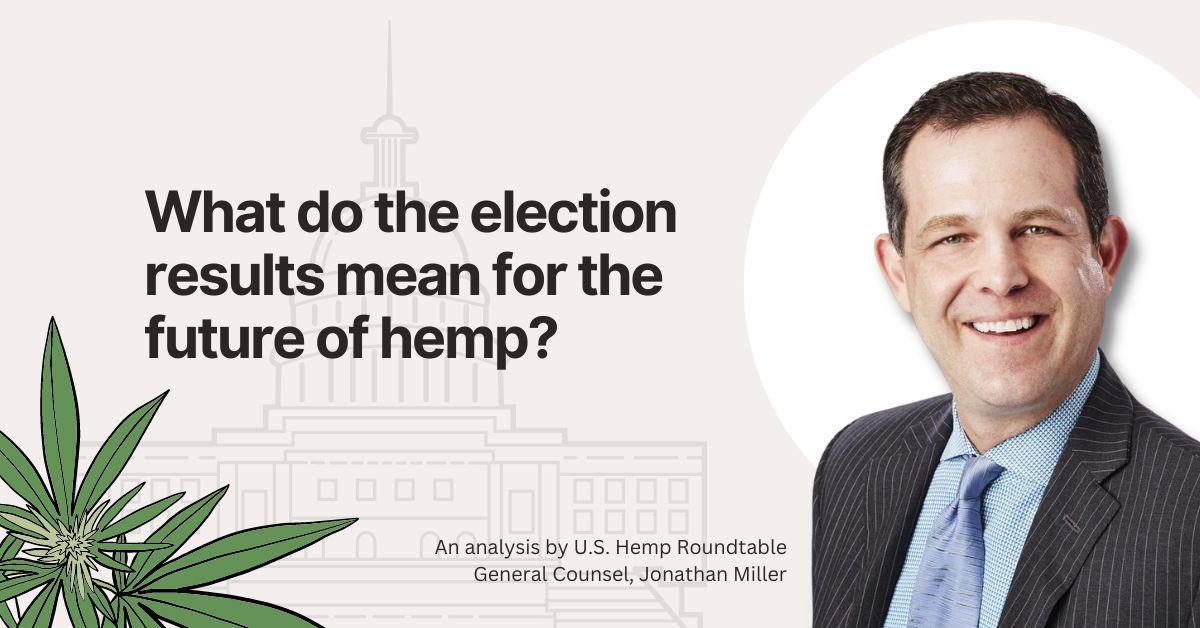INDUSTRY UPDATES
November 16, 2022
What do the election results mean for the future of hemp?

Hemp may not have been on the ballot last week, but cannabis surely was. And voters, especially the youngest, made clear that the long-term policy prospects for the entire industry are bright.
With Maryland and Missouri voters approving ballot initiatives legalizing adult-use cannabis, now more than half of American adults across the nation have access to legal marijuana. While this milestone may seem to be undermined by the loss of ballot initiatives in Arkansas, North Dakota and South Dakota, these latter votes may be the result of unrelated local political factors – a Fox News/Associated Press poll showed that strong majorities in two of those states actually support ending the prohibition on marijuana sales.
Ultimately, where cannabis reform might have been most influential is where it was only indirectly on the ballot. While many national experts had predicted a “red wave” or even a “red tsunami” propelling Republicans into strong majorities in Congress and in statehouses, the actual “pink trickle” that resulted was in significant part due to the unexpected strong turnout of young Americans who overwhelmingly voted blue. One of the key issues motivating young adults? Cannabis reform. Younger voters overwhelmingly support marijuana legalization, and President Joe Biden’s “October Surprise” of pardoning federally-convicted marijuana possessors (along with his forgiveness of billions of dollars of student debt) kept his campaign promises and may have encouraged a decisive number of younger voters to come to the polls and vote Democratic. Regardless, the growing youth voice will force elected officials from both parties to reconsider prohibitionist positions on cannabis.
Hemp, of course, is not marijuana, and benefits from an even larger, more bipartisan base of political support. But as intoxicating products gain more political ground, non-intoxicating hemp becomes even more solid in its political footing.
Hemp Supporters in Congress did particularly well on Election Day. Of the 37 congressional co-sponsors of hemp/CBD legislation on the ballot in November, 35 won re-election, including in some of the hardest fought battles such as Sen. Catherine Cortez-Masto (D) in Nevada and Rep. Don Bacon (R) in Nebraska. Democrats are especially rueing the primary loss of H.R. 841 lead sponsor Kurt Schrader (D-OR) whose more progressive primary challenger lost that seat in one of the closest election battles.
As Senate control remains in Democratic hands, there should be no major shifts in hemp policy in that body. However, control of the Senate Health Labor Education and Pensions (HELP) committee – the committee that oversees FDA and CBD regulation – shifts to two strong hemp supporters: Senator Bernie Sanders (D-VT) will chair the committee, and S. 1698 lead GOP sponsor Senator Rand Paul (R-KY) will serve as Ranking Member. This portends well for consideration of legislation that would require the FDA to regulate hemp extracts such as CBD. No change in Agriculture Committee leadership is expected – Sen. Debbie Stabenow (D-MI) will remain as chair and John Barrasso (R-WY) as Ranking Member – which will preserve a consistent strong relationship working with the U.S. Hemp Roundtable to reduce regulatory burdens on hemp farmers ramping up to the 2023 Farm Bill. Senate leadership will remain in the hands of two strong hemp champions – Majority Leader Chuck Schumer (D-NY) and Minority Leader Mitch McConnell (R-KY).
A more pronounced shift in hemp’s direction will be seen should House Republicans narrowly seize control of that body as expected. Control of the key House Energy & Commerce committee – which to date has refused to hold a hearing on FDA regulation of CBD – now transitions to Rep. Cathy McMorris-Rodgers (R-WA), who has met directly with Roundtable-convened groups of her hemp farming constituents and has indicated support for CBD hearings. Even more significantly, Rep. Morgan Griffith (R-VA), the lead Republican sponsor of both key hemp/CBD bills – H.R. 841 and H.R. 6134 – ascends to chair the Oversight Committee of Energy & Commerce, where he will likely ply his gavel in support of hemp and CBD. Further, the new Chair of the powerful House Oversight Committee, Rep. James Comer (R-KY), one of hemp most longtime supporters (check out my piece from 2013!) is committed to hauling in the FDA to explain their lack of action on CBD, and will serve on the 2023 Farm Bill conference committee. Check out his powerful advocacy for the hemp industry at yesterday’s Oversight Committee hearing.
The Chair and Ranking Member of the House Agriculture Committee will switch positions on the dais, with Rep. G.T. Thompson (R-PA) – who bemoaned at a hearing that “FDA is missing in action” on hemp – taking the gavel from Rep. David Scott (D-GA) who co-sponsored both H.R. 841 and H.R. 6134. Similarly, leaders of the key Agriculture subcommittee that oversees hemp – Del. Stacey Plaskett (D-VI) and Rep. Jim Baird (R-IN) – will switch chairs, but are expected to continue to urge consideration of CBD regulation in the 2023 Farm Bill. (Watch their video exchange here). The excellent bi-partisan Agriculture Committee staff is expected to remain in place, and we look forward to continuing to work with them closely on regulatory reform and promotion of hemp sustainability efforts. And of course, Hemp Advancement Act champion Chellie Pingree (D-ME) won re-election easily, and will continue to rise in seniority on both House Agriculture and the powerful House Appropriations committee.
_
Check out this coverage from Let’s Talk Hemp!
“Three issues in this election cycle were important to younger voters: student loans, abortion … and marijuana.” — Jonathan Miller, U.S. Hemp Roundtable

